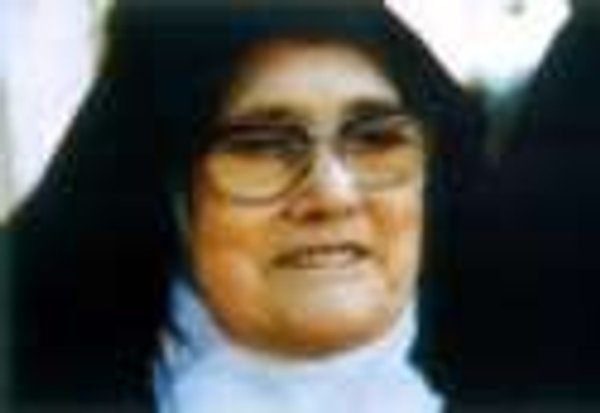This year God has called to Himself three great souls — Sister Lucia (the seer of Fatima), Pope John Paul II, and recently, Cardinal Jaime Sin. I think it is no mere coincidence that they received their everlasting reward within the Year of the Eucharist, for in each of them any Christian would see a heart with extraordinary love for the Holy Eucharist, the “summit and source” of the Christian life.
In 1917, before Lucia and her cousins Francisco and Jacinta received the Virgin Mary’s messages, they had a vision of an angel adoring the Sacred Host and the Sacred Chalice, and the same angel admonishing them to adore their God, and do reparation for the sins of all men. From that moment on, those three innocent souls gladly offered little sacrifices and corporal penance, and would frequently prostrate themselves on the ground (as they pastured their sheep), imitating the angel, and repeating the prayer they had heard him recite before the Sacred Host. (When she died, the whole of Portugal paid her homage; and that includes the government, which was openly anti-religion in 1917.)

Almost a hundred years after, John Paul II would leave his “last will” to the whole Church — the encyclical Ecclesia de Eucharistia, which is destined to be a standard reference point in contemporary theology. It is no exaggeration to say that this deep and moving letter of the Pope is as much the fruit of the thousands of hours he had spent kneeling down before the Blessed Sacrament as it is the product of his penetrating theological mind.
And how will Cardinal Sin be remembered? It is out of justice that we tell the future generations of Catholics in our country that he fostered the setting up of perpetual adoration chapels in parish churches in Manila. This new element of Church architecture is not a mere annex to the church building; in fact, it is like an extension of the altar where the Holy Mass is celebrated — the memorial of Jesus’ death and resurrection. In any of these adoration chapels, anyone who has knelt and prayed before the Sacred Host in the monstrance always comes out “a winner”: he invariably wins God’s peace — a very much sought after commodity by all of us. I therefore think that to say that Cardinal Sin inspired “people power” is to say only half of the truth; above all, he inspired “prayer power”, there before the Blessed Sacrament in the silence of his private chapel. By his life as pastor, he has taught us that there can only be peace in our homes and in society if more of our time were spent kneeling before God than in talking and arguing.

“The good shepherd lays down his life for his sheep”. How sincerely Cardinal Sin imitated Jesus Our Lord from whose own lips these words flowed! In the first place, the cardinal truly loved his parish priests; he was a real father to them — ever solicitous, generous, and ready to help a faltering priest. God gave him a big heart where everyone could find friendship, encouragement, and laughter. In 1987, when the late Bishop Alvaro del Portillo (the former prelate of Opus Dei) visited our country, he was so touched by the warm hospitality shown by Cardinal Sin in a dinner he organized at Villa San Miguel. (He did the same for the present prelate, Bishop Javier Echevarría, in 1998.) Bishop del Portillo used to invite him for lunch whenever the cardinal was in Rome; among other reasons, he wanted to have some moments of joyful laughter hearing the amusing stories of Cardinal Sin. The “lighter side” of the great John Paul II was perhaps known to only a few people; but surely, Cardinal Sin was one of them. How much did the cardinal lighten the load on the Pope’s shoulders by the joy-filled conversations they would engage in!
Sister Lucia the Portuguese shepherd girl, Karol Wojtyla the Polish second world war survivor, Jaime Sin the descendant of Chinese migrants — ordinary souls chosen by God from distant points of the globe to be his messengers of peace and teachers of prayer: let us give thanks to God for His extraordinary gifts to mankind.
-----
Msgr. Joseph S. Duran is the Regional Vicar of Opus Dei in the Philippines.
